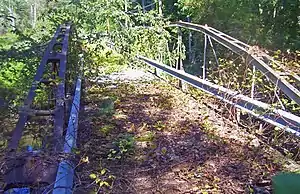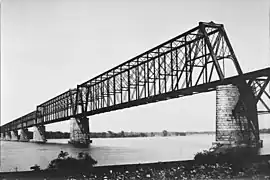Squire Whipple | |
|---|---|
 | |
| Born | September 16, 1804 |
| Died | March 15, 1888 (aged 83) Albany, New York, US |
| Occupation | Civil engineer |
| Spouse | W. Anna Case |
| Parent(s) | James Whipple and Electa Johnson |
| Signature | |
.png.webp) | |
Squire Whipple (September 16, 1804 – March 15, 1888) was an American civil engineer.
Biography
Squire Whipple was born in Hardwick, Massachusetts on September 16, 1804.[1] His family moved to New York when he was thirteen. He received his secondary education at the Fairfield Academy in Herkimer, New York, and graduated from Union College in New York after only one year. He has become known as the father of iron bridge building in America.[2]
He died March 15, 1888, at his home in Albany, New York, US and was buried in Albany Rural Cemetery, Menands, New York.[1]
Bridges
The Whipple Cast and Wrought Iron Bowstring Truss Bridge over Norman's Kill in Albany, New York, is a very well preserved example of a Whipple Bowstring Arch Truss. Constructed by S. DeGraff of Syracuse, New York, 1867–69, it is still in daily use, with no posted weight limits. Due to the sleek appearance, many users think it is a modern bridge. (The Delaware Turnpike once ran through both neighborhoods until 1929 with the construction of a new much higher, longer, and wider Delaware Avenue Bridge over the Normans Kill. This allowed commuters to and from Albany to bypass both Normansvilles. The original Whipple Bowstring bridge still stands, though it has been closed to vehicular traffic since January 1990.) Another example stands on the campus of Union College in Schenectady, New York, where it serves as a pedestrian walkway.
Whipple's patented designs were implemented in numerous bridges, both Whipple truss and prefabricated bowstring arch truss bridges, which became the standard design for Erie Canal crossings; using an economical mix of wrought iron for tension members and cast iron in compression. Another such bowstring arch is the Shaw Bridge, the only known Whipple design at its original location and the only known "double" believed extant. Consisting of two identical spans sharing a common pier, it has been described as "a structure of outstanding importance to the history of American engineering and transportation technology."[3] There are at least four other Whipple bowstrings standing in Central New York state, and one in Newark, Ohio.

 Shaw Bridge, Claverack, New York, the only known double-span Whipple bowstring arch, has two identical spans sharing a common pier
Shaw Bridge, Claverack, New York, the only known double-span Whipple bowstring arch, has two identical spans sharing a common pier Completed after Whipple's death, the Cairo Rail Bridge was built in two 518 feet (157.9 m) Whipple truss spans, each the largest of that design ever constructed.[4]
Completed after Whipple's death, the Cairo Rail Bridge was built in two 518 feet (157.9 m) Whipple truss spans, each the largest of that design ever constructed.[4]
Patents
- U.S. Patent 2,064 – Bowstring iron-bridge truss (1841)
- U.S. Patent 134,338 – Lift draw bridge
Books
References
- 1 2 Engineering News and American Railway Journal. Vol. 19. New York: Engineering News Publishing Co. January–June 1888. p. 231. Retrieved December 22, 2021 – via Google Books.
- ↑ Survey number HAER NY-4 - Whipple Cast & Wrought Iron Bowstring Truss Bridge, Normans Kill Vicinity, Albany, Albany County, NY (Biography on page 3)
- ↑ Raymond W. Smith (January 1979). "National Register of Historic Places Registration: Double-Span Whipple Bowstring Truss Bridge / Shaw Bridge". New York State Office of Parks, Recreation and Historic Preservation. Archived from the original on March 3, 2016. Retrieved August 9, 2008. (includes map and diagrams)
- ↑ Historic American Engineering Record (Library of Congress). Survey number HAER NE-2. pages 221–261.
External links
- Genealogy Squire Whipple, Whipple.org
- Squire Whipple essay, Whipple.org
- ASCE – History and Heritage of Civil Engineering
- Squire Whipple at Structurae
- Survey number HAER NY-4 – Whipple Cast & Wrought Iron Bowstring Truss Bridge, Normans Kill Vicinity, Albany, Albany County, NY (Biography on page 3)
- Photo of an all-wood Whipple bowstring arch truss bridge built in 1882 in Santa Cruz, California (Santa Cruz Public Library collection)